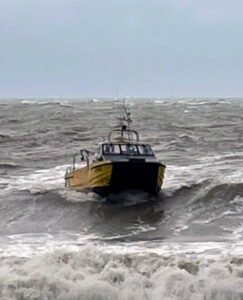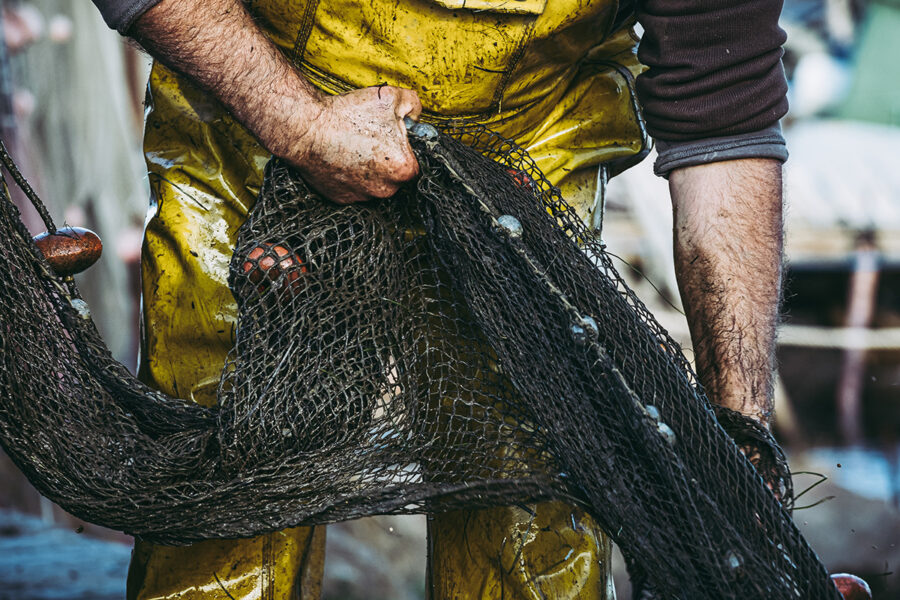BBC Solent, the local radio station covering the Isle of Wight, Portsmouth, Southampton and the surrounding area, ran a feature last week on the MCA under-15m code, with the presenter expressing bewilderment about its failure to sort basic issues, reports Andy Read.
The programme interviewed Isle of Wight-based boatbuilder Cheetah Marine and customer Geoff Blake of Ventnor Haven Fishery, who has a new-build Cheetah on order. FN has covered previously the new requirements from the MCA for these vessels to be built with fuel tanks above deck, rather than below, despite the fact that this reduces stability, increases the risk of pollution, and is not considered to be a safety issue on identical designs used outside the fishing industry (Fishing News, 11 August, ‘Cheetah Marine: A tale of two codes’).

A Cheetah catamaran off Ventnor, where the sea conditions make stability of critical importance. (Photo: Geoff Blake)
Geoff Blake told the programme: “In the Solent we get rapidly changing conditions and need to react quickly when the weather changes. As soon as you add more weight above decks, it creates issues. We need new boats, I have young lads willing to go to sea, but at the moment the MCA is making us build vessels that are less safe than the boat we built five years ago.
“We have just two boats left in Ventnor, when we need a minimum of three or four to make the business work. We need the people who make the rules to understand the implications of what they are doing. No one is listening, answering questions or talking to us. All we have is a hope that the press will waken them up to the situation.”
The MCA, based in Southampton, declined to take part in the programme but did issue a statement to the BBC saying: “We support the fishing industry and recognise the dangers involved, which is why safety is always our top priority.
“Recommended changes to fuel tank placement came about to minimise fire risks and to improve safety in a range of ways, through proper long-term third-party oversight of related systems. The latest fishing vessel codes provide for improved safety checks by the MCA, through requirements for ongoing maintenance and inspection.
“If a proposal for an under-deck petrol tank installation was presented to MCA HQ, through the normal exemption application process, it would be looked at on its merits.”
Many FN readers will already be aware that simply starting the request process for such exemptions comes at a significant cost – £588 for the MCA to merely consider the installation of fuel tanks below deck, and £147 an hour, including travel time, for any inspection work related to the request.”
In addition, there is the issue of time delays, which see many vessel owners tied up for weeks awaiting a re-inspection, quite often on what are very minor defects.
However, Cheetah Marine’s Sean Strevens told the programme that that wasn’t the only issue. “Individually, the MCA officers are really helpful, but their system is broken. We have been talking to them for years about this, but nothing has happened.”
BBC presenter Alun Newman quite innocently asked: “Why can’t you just phone the MCA and say that this doesn’t make any sense?” – a comment that may bring a wry smile to any FN reader who has tried to do just that.
In reply Sean Strevens said: “We are working to three different codes, two of which allow under-deck fuel tanks, one of which does not. Bureaucracy seems to be getting in the way of common sense.”
After the programme, Geoff Blake told FN: “We need a decision in the next couple of weeks before the deck is laid down. As you can see from the picture (above), working out of Ventnor we need all the stability we can get.”
Without an answer, he will either be forced to continue building a vessel that is less safe than its counterpart built five years ago, or to stop the build process entirely until the MCA comes up with a definitive answer to the request to approve below-deck tanks.
Listening to the programme was ex-MCA surveyor turned safety officer for the NFFO Charles Blyth – the fourth part of whose series about preparing for MCA inspections is on page 9.
He told FN: “Whilst the NFFO welcomes safer standards for the construction of new fishing vessels, we believe the insistence by the MCA on this requirement is questionable. The risk involved with fitting a petrol fuel tank below or above deck should be based on factual, objective evidence.
“Statistically, the number of fishing vessels that capsize by far outweighs any incidents regarding the stowage of petrol. It is well known and communicated by the MCA that the reduction of weight on or above the deck of a vessel is beneficial to stability, and this is even clear in media campaigns such as Home and Dry. In addition, this requirement seems to contradict the standards of other legislation for commercial vessels.
“There is ever-increasing pressure regarding emission regulations, and we believe that rules such as this will push vessel owners to select fuel sources which are more damaging to the environment than petrol. The MCA policy seems to indirectly push people the opposite way to the bigger- picture message we hear from central government.
“Our members have also directed concern at the vulnerability of fuel tanks on a working deck which will be susceptible to damage, corrosion from the environment and wear from gear on deck.
“Therefore, we believe that new small fishing vessels should have the ability to fit fuel tanks below deck, providing that the fuel tank is of an appropriate standard and construction, and that the tank can be isolated easily should the need ever arise.
“We welcome any engagement from the MCA regarding this matter, and believe that the construction standard and associated code of practice would benefit from review in several areas to ensure the standard remains fit for purpose for the current and future industry.”
This story was taken from the latest issue of Fishing News. For more up-to-date and in-depth reports on the UK and Irish commercial fishing sector, subscribe to Fishing News here or buy the latest single issue for just £3.30 here.








